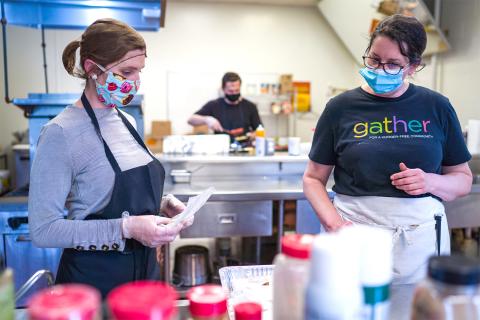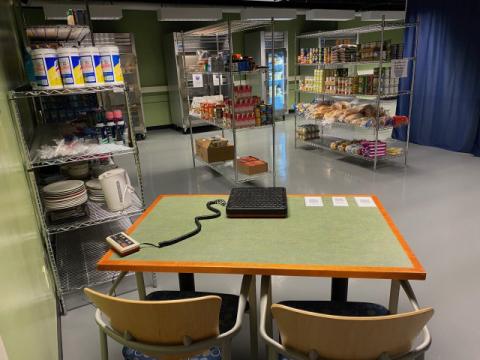Key Findings
College students with disabilities are more likely to experience higher rates of food insecurity relative to students without disabilities.
More than one-third of students with disabilities reported food insecurity, with 23.1% experiencing low food security and 12.8% experiencing very low food security.
Among the total sample of college students, 18.8% reported food insecurity, exceeding the national average of 10.2% for all households in the United States.
About the Co-Author
Jesse Morrell, Principal Lecturer and Associate Chair of Agriculture, Nutrition and Food Systems
Contact information: Jesse.Morrell@unh.edu
This research was published in the INSPIRED: A Publication of the New Hampshire Agricultural Experiment Station (Summer/Fall 2023)
Researchers: G. Stott, A. Taetzsch and J.S. Morrell
New England is one of the least food insecure regions in the United States, with New Hampshire consistently ranking among the most food secure. However, averages can obscure significant variability that can occur among different demographic and socioeconomic groups, such as college students, who experience higher than national average rates of food insecurity. When coupled with other factors that may impair or restrict individuals from accessing food, the adverse impacts of food insecurity are exacerbated. This research aimed to explore the prevalence of food insecurity among college students with disabilities at a northeastern university. While previous studies have separately reported increased risks of food insecurity among college students and individuals with disabilities, the specific intersection of college students with disabilities had not been extensively examined. This study sought to address that gap.
Defining Disability and Food Insecurity
Disability refers to a condition of the body or mind that makes it more difficult for a person to perform certain activities and interact with the world around them. It includes impairments that can limit a person’s ability to participate fully in various aspects of life. In this research, disability encompassed a range of conditions that may affect college students, including physical, cognitive, sensory and mental health disabilities.
Food insecurity refers to the lack of sufficient access to food that is necessary for an active and healthy life. It means that individuals or households do not have enough resources to obtain an adequate amount of nutritious food on a regular basis, which can lead to disruptions in eating patterns and reduced food intake. Food insecurity is a complex issue influenced by various factors, including economic circumstances, access to affordable and nutritious food, and individual or household resources.
Previous Studies on Disabilities and Food Insecurity Among College Students
Previous research has separately highlighted the increased risk of food insecurity among college students and individuals with disabilities. According to past studies, approximately one out of every five college students has been identified as having a disability, encompassing various physical, cognitive, sensory and mental health conditions. College students often face economic hardships, including food insecurity, due to the high costs of education and other expenses. Studies have shown that rates of food insecurity among college students range from 14% to 59%, which exceeds the national average for all households. Additionally, individuals with disabilities have been found to have higher rates of food insecurity compared to those without disabilities. Research indicates that young adults with disabilities are more likely to experience food insecurity in their households compared to their peers without disabilities.

UNH’s Food Repurposing Project — a collaborative effort among COLSA, UNH Hospitality Services and the Gather food bank — takes unused food from UNH dining halls and distributes to those in the community in need.

Methodology
The study employed a cross-sectional research design and collected data between 2018 and 2020 at a public northeastern university. The data were part of the ongoing College Health and Nutrition Assessment Survey, which is intended to assess the multiple dimensions of college students’ well-being, including food security and disability status. The researchers used an online survey to gather self-reported disability and food security information from a diverse sample of 880 participants. The sample consisted of college students, with a majority being female (61.6%) and white (94.5%), with an average age of 19 years. Among the participants, 13.3% reported having a disability. Chi-square and logistic regression analyses were employed to examine the differences in food insecurity between college students with and without disabilities.
Key Findings and Significance
The study found that approximately one out of every five participants reported low or very low food security, indicating inadequate access to food resources. Participants with disabilities were more than twice as likely to experience food insecurity compared to those without disabilities. This disparity highlights the vulnerability of college students with disabilities and emphasizes the need for targeted support and resources to address their unique challenges. By understanding the prevalence of food insecurity in this population, institutions can work towards creating a more inclusive and supportive environment for all students to thrive academically and personally.
Related Published Research:
Stott, G.N., Taetzsch, A., & Morrell, J.S. (2023). College students with disabilities report higher rates of food insecurity. Disability and Health Journal. Advance online publication. https://doi.org/10.1016/j.dhjo.2023.101485



